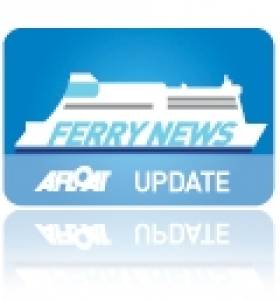Displaying items by tag: Epsilon Rosslare
Welsh Ferry Route Sailings Resume Following French Car-Trading Epsilon
#CarTrading – Irish Ferries chartered ro-pax Epsilon, a year in service as previously reported, resumed Dublin-Holyhead service this afternoon, following cancellations last night due to the ship making interim 'freight-only' sailings to France, writes Jehan Ashmore.
Epsilon had completed the Rosslare-Cherbourg freight round-trip yesterday and this was understood to have involved carrying trade-cars, in which she also carried a year ago and on the same route.
These latest sailings to and from Rosslare by Epsilon, followed her additional routine duties on the Dublin-Cherbourg route over the weekend. The continental route's sailing schedule normally includes a return arrival to the Irish capital on Monday morning's, however since last week and that of yesterday, her inward bound sailings from France have instead docked in Rosslare.
According to Irish Ferries, sailings from France will continue to call to Rosslare, until the operator's cruiseferry, Oscar Wilde, resumes Rosslare-Cherbourg sailings next month and in May to Roscoff.
It was on that first Monday last week, that the 500 passenger and crew capacity, Epsilon, had disembarked her low-season winter traffic of motorist-passengers and freight-vehicles in Rosslare. She does not take any 'foot' passengers on any of her Welsh and French route sailings.
Having discharged, Epsilon continued that same day by sailing in ballast to Dublin Port in readiness for the following day's sailing to Holyhead. The ro-pax ferry operates a Tuesday's to Friday's roster, while Ulysses, recently returned from an annual overhaul, serves sailings all week.
Ulysses main route partner, the high-speed craft HSC Jonathan Swift, is undergoing maintenance but is due to re-enter service this Friday's (30 January) morning sailing of 08.45 departing Dublin Port.
As for Epsilon's second inbound call to Rosslare yesterday, (to recap in a freight-mode) she did not continue on the same day the final leg to Dublin Port but remained in Rosslare. This led to the cancellation of today's early morning sailing to Holyhead and corresponding return sailing.
Epsilon would otherwise have taken lay-over time in Dublin Port, occasionally at a berth close to the East-Link Bridge but instead she was alongside Rosslare's inner pier.
Berthed adjacent was Stena Line's ro-pax Stena Horizon, also built by the same Italian yard Visentini. The coincidences continue, as she was on a routine Monday layover in between sailings that also serve to and from Cherbourg.





























































